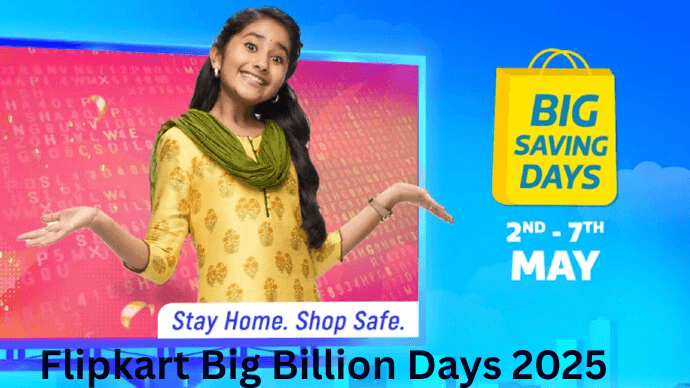Flipkart Big Billion Days 2025: Users Outraged by Misleading Prices and iPhone 16 Plus Order Cancellations
'Flipkart’s Big Billion Days 2025 sale' has sparked major outrage as customers report misleading prices, sudden order cancellations, and unavailable Apple iPhone 16 Plus units. Here’s a detailed report on user backlash and concerns.
Flipkart Big Billion Days: Users Furious Over Misleading Prices, Apple iPhone 16 Order Cancellations
India’s biggest e-commerce festival, Flipkart Big Billion Days 2025, has once again found itself being criticized, not for the flashy offers but for what many users are calling misleading pricing tricks and unfair order cancellations.
The controversy escalated when thousands of customers across the country complained about their Apple iPhone 16 Plus orders being abruptly canceled, despite the devices being shown as available at heavily discounted prices during flash sales.
Flipkart Big Billion Days 2025
Instead of celebrating the festival deals, many users took to social media platforms like X (formerly Twitter), Instagram, and Reddit to vent their frustration at Flipkart. Hashtags like #FlipkartScam and #BigBillionDaysFraud started trending, putting the e-commerce giant in the spotlight for all the wrong reasons.
The iPhone 16 Plus Order Cancellation Controversy
Apple’s newly launched iPhone 16 Plus was among the most awaited smartphones at the Flipkart Big Billion Days sale.
Promoted with aggressive advertisements across TV, YouTube, and digital banners, the phone was marketed as one of the festival’s “unmissable best deals.”
However, as soon as sales went live, customers rushed to grab the deal, only to face:
Sudden “Out of Stock” errors even after successfully adding the phone to cart.
Auto-cancellations within minutes of completing payment.
Refund delays creating trust issues among prepaid customers.
Some users submitted screenshots showing that the iPhone 16 Plus was displayed at ₹59,999 as part of an exclusive flash deal.
But after completing orders, Flipkart notified them that the transaction “could not be fulfilled due to limited stock,” sparking widespread allegations of “fake listing” and “bait advertising.”
Misleading Prices Raise Questions
Apart from iPhone issues, many Flipkart shoppers raised concerns about manipulative discount displays.
Some users noticed that products were first marked at artificially inflated “original prices” only to be highlighted as being “70% off.”
For example, a refrigerator initially costing ₹29,999 was shown at a “list price” of ₹39,999, only to be “discounted” back to ₹29,499, with barely a real saving.
These practices have made many customers feel cheated, with consumer forums claiming that such tactics may fall under misleading advertising guidelines by the Advertising Standards Council of India (ASCI).
Social Media Backlash Against Flipkart
The discontent quickly spread online. Tweets and posts flooded timelines with screenshots of order cancellations, long refund periods, and “sold out” pop-ups within seconds of payment confirmations.
Representative user reactions included:
“Booked iPhone 16 Plus on Flipkart BBD, payment deducted, but order canceled in 10 mins. Total scam!”
“Every year Flipkart calls it Big Billion Days, but feels more like Big Billion Fraud.”
“If there’s not enough stock, why advertise as limited time mega discount?”
Such waves of negative feedback during a crucial festival period have likely tarnished Flipkart’s brand image, especially among loyal customers who were counting on genuine deals.
The Trust Deficit in Indian E-Commerce
This is not the first time Indian e-commerce platforms have faced consumer outrage during mega sales.
Artificial scarcity, sudden cancellations, and hidden terms have been recurring themes, leading many experts to question the level of transparency followed in online festival deals.
For Flipkart, controversies surrounding misleading discounts are particularly damaging as rival Amazon India has also begun its Great Indian Festival sale around the same period.
Clear trust issues could push frustrated shoppers to switch platforms during this competitive festive season.
Legal and Regulatory Angle
Consumer rights organizations argue that Flipkart’s alleged practices could invite scrutiny under India’s Consumer Protection (E-commerce) Rules 2020.
According to these rules, platforms are not allowed to misrepresent prices, mislead about discounts, or cancel orders without valid reasons.
The Department of Consumer Affairs (DoCA) has in the past taken suo motu cognizance of misleading online sales.
If user complaints pile up, Flipkart may face regulatory questioning or penalties.
Flipkart’s Response
Flipkart has yet to release a detailed official statement. However, initial responses by its support team on social media suggest generic replies citing “high demand and limited stock availability.”
While cancellations may stem from logistical constraints, many customers argue that Flipkart should not aggressively advertise products without adequate inventory.
Impact on Customer Loyalty
E-commerce thrives on consumer trust. Heavy promotions promising high-demand gadgets like iPhones create massive hype. When these promises fall flat due to cancellations and “pricing games,” it directly erodes brand reliability.
For many, this controversy has made them reconsider festive online shopping. Instead, several users claim they will buy gadgets offline from Apple Authorised Resellers or other trusted electronic stores, even if it means paying slightly higher prices.
Final Thoughts
The Big Billion Days was supposed to be a festive bonanza, but for multiple customers, it has turned into a frustrating experience. The iPhone 16 Plus order cancellations and misleading discount displays have placed Flipkart under heavy criticism.
With social media amplifying consumer voices louder than ever, e-commerce companies can no longer ignore accountability.
